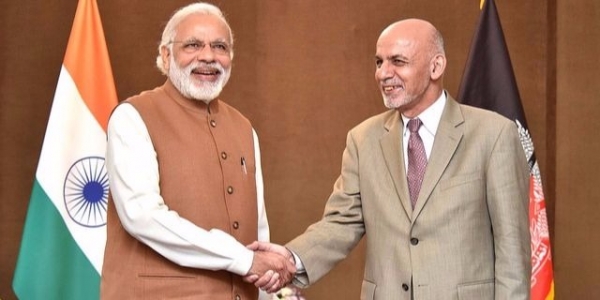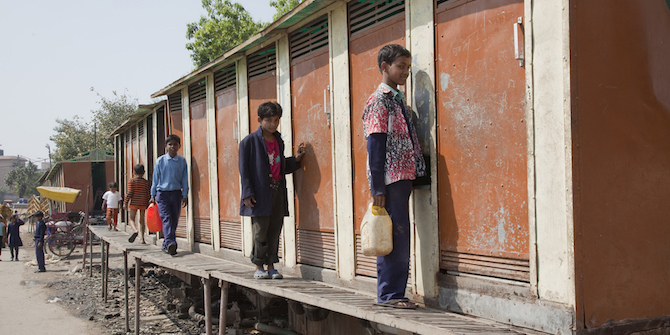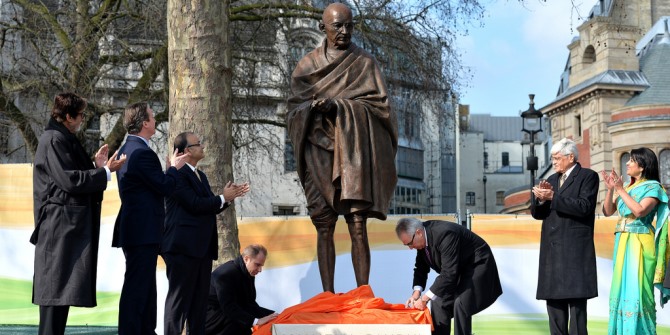 LSE South Asia Centre and LSE SU Pakistan Development Society recently hosted Rahul Roy-Chaudhury, Senior Fellow for South Asia at the International Institute for Strategic Studies (IISS), for the event titled “Can Intelligence Services Do Good?”. Roy-Chaudhury talks to Mahima A. Jain on India’s foreign policy, its involvement in Afghanistan, the difference in the operational styles of R&AW and ISI, and India’s approach in the Indian Ocean region.
LSE South Asia Centre and LSE SU Pakistan Development Society recently hosted Rahul Roy-Chaudhury, Senior Fellow for South Asia at the International Institute for Strategic Studies (IISS), for the event titled “Can Intelligence Services Do Good?”. Roy-Chaudhury talks to Mahima A. Jain on India’s foreign policy, its involvement in Afghanistan, the difference in the operational styles of R&AW and ISI, and India’s approach in the Indian Ocean region.
MJ: It was pointed out at the event that efforts of intelligence agencies to counter and foil terrorism activities often go unnoticed and unannounced. However, you mentioned that it is not in the business of Intelligence agencies to do good. Can you elaborate?
It is not the business of intelligence agencies to do good in the sense of a charity organisation doing good for the people, the community and the country. The priorities if Intelligence agencies are the country’s security, its defense, and its prosperity. And, if at times it has to employ unorthodox, or sometimes imaginative, means to create legal loopholes for these tasks, so be it. Intelligence agencies have often to be ‘ruthlessly pragmatic’ and always concerned over ‘worst case scenarios’ with tough choices to make at the best of times.
MJ: It is often said that R&AW doesn’t have the power and experience that ISI does because of the latter’s interaction with international agencies. Can you elaborate?
RRC: A key difference between India’s civilian external intelligence agency R&AW and Pakistan’s military intelligence agency ISI is that whereas R&AW is influential, ISI is powerful. The reason for this is not only in relation to the disproportionate power of the army in Pakistan’s domestic politics and the dominating role of the ISI in Pakistan’s domestic security, but that the ISI ran the Afghan Mujahideen campaign against the erstwhile Soviet occupation of Afghanistan in the 1980s and 1990s at the behest of global western intelligence agencies, especially the American CIA. Therefore, for many older – as well as current – stalwarts of the ISI, it felt as if they had served to defeat a global empire in Afghanistan while working with the most powerful intelligence agencies in the world.
In contrast, R&AW ran no such campaign and the well-known covert operation it ran in Sri Lanka itself came unstuck with the deployment and then the abrupt withdrawal of the Indian Peacekeeping Forces (IPKF) in Sri Lanka in the late 1980s. No amount or extent of current intelligence cooperation with other countries can make up for actual covert operations in foreign countries, which the ISI has far more experience of in Afghanistan than R&AW does in any other country.
MJ: India and Afghanistan have had strong relations in the past and India has been a big donor, with several on-going and upcoming infrastructure projects. However, with the change in US foreign policy on South Asia will India have a chance at widening its influence in Afghanistan?
RRC: The new US regional strategy on Afghanistan provides new opportunities for India – this is the first time that the US has openly announced India to be a key player in Afghanistan’s stability, been publicly hugely critical on Pakistan over its ‘safe haven’ to terror organisations, and formally sought an enhanced role for India in Afghanistan’s economic development.
But India’s influence in Afghanistan will remain limited in the absence of geographical contiguity and Pakistan’s refusal to grant it transit and trade access to Afghanistan through Pakistan due to political and security reasons. While India has inhibitions over continuing to develop the Chabahar Port to provide seaward access to Afghanistan due to US president Trump’s targeting Tehran, India has agreed to continue with its $3 billion aid by taking in new projects such as the Shahtoot dam in the Kabul river basin, a polyclinic in northern Mazar-e-Sharif and additional capacity-building projects. It will also seek to strengthen training and support to the Afghan security and police forces, but has made it clear that it will not send troops to Afghanistan, largely over concerns of provocation to Pakistan, which would see this as an attempt to militarily counter Pakistan in Afghanistan and exert pressure on its western – in addition to its eastern – flank.

MJ: How is the current government’s approach to international diplomacy and security different?
RRC: Yes, the Modi government has adopted a ‘neighbourhood first’ policy that is “ruthlessly pragmatic”. There will be no talks till terror from Pakistan decreases; New Delhi will seek to ‘isolate’ Pakistan internationally till it changes its policy towards the support of terrorism against India; India will toughen its position towards China on the border dispute; New Delhi will oppose the China-Pakistan Economic Corridor on the basis that it passes through parts of Kashmir claimed by India; India will become a ‘leading power’ in the Indian Ocean; and New Delhi will seek to challenge both the narrative as well as the impact of China’s expansion of influence in South Asia (with the exception of Pakistan) and the Indian Ocean — all these are new and dominant aspects of Modi’s foreign and security policy that no previous Indian government was bold enough to undertake.The Modi government has placed counter-terrorism at the top of its international agenda for security cooperation with governments.
Alongside this is the personal diplomacy of Prime Minister Modi as well as the ability to seek to implement decisions taken, a huge difference from the last three years of the Dr. Manmohan Singh government.
MJ: With both India and China have been vying for influence in the Indian ocean region, how is India’s approach different, and what has it managed to achieve so far?
RRC: A new Indian security doctrine is emerging in the Indian Ocean which is set to: challenge the narrative and impact of China’s influence in the region by providing economic, energy, port and financial incentives to countries such as Bangladesh and Sri Lanka; become the ‘first responder’ to humanitarian and disaster relief operations; go beyond being a ‘net security provider’ to Indian Ocean island states by providing military finance and assistance; push a strong security agenda in the southwestern Indian Ocean with Mauritius and the Seychelles; and promote strategic and maritime security and defence cooperation with the US, Japan, Australia and Vietnam.

Image credit: Indian Navy / CC BY 2.5 IN
MJ: Terrorism was one of the reasons mentioned by the Indian government with regards to deportation of Rohingya refugees in India. Any insights on why this is a security issue, and how does the Rohingya crisis affect foreign policy and relations in South Asia?
India has to balance the humanitarian issue over Rohingya refugees’ suspected links with Rohingya militant organisations as well as ISIS and Al Qaeda. India also needs to balance its improvement in security relations with Bangladesh with its developing relations with Myanmar.
MJ: With regards to the Doklam issue, observers say Bhutan “held its breath” (as NYT puts it) as it was squeezed by India and China. How do you see Bhutan’s position in the Doklam Standoff and its later response and India’s response to the situation?
RRC: India’s response to the Doklam issue showed the toughness as well as the restraint with which the Modi government is now inclined to deal with China. This is far from resolved; it is simply a pause. The strengthening of the Chinese president in the just concluded party conference could serve to further complicate matters. Bhutan made its position very clear in the beginning, which supported India’s stance – there was no need to reiterate it. Yet, another lesson for India is also that it needs to engage with Bhutan on a continuous basis and needs to understand and deal with its domestic political changes, with impact on relations with New Delhi.
You can watch the event “Can Intelligence Services Do Good?” here.
This article gives the views of the authors, and not the position of the South Asia @ LSE blog, nor of the London School of Economics. Please read our comments policy before posting.
 Rahul Roy-Chaudhury heads the South Asia programme at the IISS and a visiting faculty member of the Royal College of Defence Studies, London . He writes on regional security and stability, and also organises several ‘track 1.5’ meetings. He is also involved with the foreign service program at Oxford and the National Defence College (New Delhi).
Rahul Roy-Chaudhury heads the South Asia programme at the IISS and a visiting faculty member of the Royal College of Defence Studies, London . He writes on regional security and stability, and also organises several ‘track 1.5’ meetings. He is also involved with the foreign service program at Oxford and the National Defence College (New Delhi).
 Mahima A. Jain is blog editor at LSE South Asia Centre. She has a MA in Journalism and has worked as an editor and journalist in India. She tweets @mahima_a.
Mahima A. Jain is blog editor at LSE South Asia Centre. She has a MA in Journalism and has worked as an editor and journalist in India. She tweets @mahima_a.







